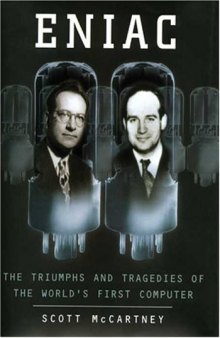دانلود کتاب ENIAC: The Triumphs and Tragedies of the World’s First Computer
by Scott McCartney|
|
عنوان فارسی: انیاک: پیروزی و تراژدی اولین کامپیوتر |
 دانلود کتاب
دانلود کتاب
 جزییات کتاب
جزییات کتاب
Today's computers are fantastically complex machines, shaped by innovations dreamt up by hundreds of engineers and theorists over the last several decades. Does it even make sense, then, to ask who invented the computer? McCartney thinks so, and in ENIAC: The Triumphs and Tragedies of the World's First Computer, he's written a compelling answer to the question, crediting two relatively unsung Pennsylvanians with what is arguably the most significant invention of the century.
McCartney's heroes are Presper Eckert and John Mauchly, and as he makes clear, there are those who might question the choice. Nobody doubts the pair designed and built ENIAC, the world's first fully electronic computer and a watershed in the history of computing. But for years the importance of their contribution, made during World War II and sponsored by the U.S. Army, has been downplayed. The brilliant John von Neumann's subsequent theoretical papers on computer design have made him the traditional "father of modern computing." And Eckert and Mauchly later even lost the patent on their machine when it was claimed that another early experimenter, John Atanasoff, had given them all the ideas about ENIAC that mattered.
But McCartney's meticulously researched narrative of Eckert and Mauchly's careers--covering the thrilling three years of ENIAC's construction and the frustrating decades of little recognition that followed--sets the record straight. He carefully weighs Atanasoff's claims and gives von Neumann the credit he earned for advancing computer science, but in the end he leaves no room for doubt: if anyone deserves to be remembered for inventing the computer, it's the two men whose tale he has told here so engagingly. --Julian Dibbell





 این کتاب رو مطالعه کردید؟ نظر شما چیست؟
این کتاب رو مطالعه کردید؟ نظر شما چیست؟
